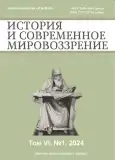Implementation of Agricultural Tax Among Collective Farmers of the Urals in the Second Half of the 1930s
- Авторлар: Filatov V.V.1
-
Мекемелер:
- Nosov Magnitogorsk state technical University
- Шығарылым: Том 6, № 1 (2024)
- Беттер: 57-69
- Бөлім: ECONOMIC HISTORY
- URL: https://bakhtiniada.ru/2658-4654/article/view/258323
- DOI: https://doi.org/10.33693/2658-4654-2024-6-1-57-69
- EDN: https://elibrary.ru/JFNVZS
- ID: 258323
Дәйексөз келтіру
Аннотация
The relevance of the study of agricultural taxation of the collective farm peasantry is due to the fact that at present there are still not enough scientific publications on this problem, which is important for historical, economic and legal sciences. It is necessary not only to analyze the legislation on agricultural tax, but also to reveal the nuances of its practical implementation among collective farmers. Experience of taxation in the 1930s. in such a large region as the Greater Urals will be of interest to scientists engaged in similar research in other areas of the country. The object of study is the Ural collective farmers, and partly, before the introduction of income tax in 1936, collective farms, and the subject is the legislation on agricultural tax and its impact on the real economic opportunities of collective farm households to ensure the normal existence of the family. The time frame of the study is determined by the second half of the 1930s, when collectivization was completed and most of the taxation fell on the collective farm peasantry. The purpose of the article is to use new sources and approaches to systematize the available material and identify the peculiarities of taxation of collective farmers in the Urals. The work used general scientific methods, as well as comparative, historical-genetic, statistical and others. The study showed that during the period of economic modernization, with the help of the agricultural tax, issues of strengthening the state budget were resolved, part of which was directed to the needs of the village. For collective farmers, in the conditions of constant growth not only in agricultural taxes, other payments and in-kind duties, they had to experience difficulties in the family budget. The restrictions of the Charter of the agricultural artel did not allow the personal farmstead to develop to its full potential. Attempts by collective farmers to devote more time to their farming and to expand crops were resolutely suppressed, especially in the late 1930s. Not all collective farmers could withstand the hardships of collective farm life with a low assessment of their work and high duties, so some of them left the collective farm, joining the number of individual farmers, state farm workers, and city workers.
Негізгі сөздер
Толық мәтін
##article.viewOnOriginalSite##Авторлар туралы
Vladimir Filatov
Nosov Magnitogorsk state technical University
Хат алмасуға жауапты Автор.
Email: v.philatov@mail.ru
ORCID iD: 0000-0003-3076-2324
Dr. Sci. (Hist.), Associate Professor, Leading Researcher at the Research Institute of Historical Anthropology and Philology
Ресей, MagnitogorskӘдебиет тізімі
- Beznin M.A., Dimoni T.M. Duties of Russian collective farmers in the 1930–1960s // Domestic history. 2002. No. 2. pp. 96–111.
- Vyltsan M. A. The last individual farmers. Source base, historiography // The fate of the Russian peasantry. M.: Russian State Humanitarian University. 1995. P. 364–387.
- Denisevich M. N. Individual farms in the Urals (1930–1985). Ekaterinburg: Institute of History and Archeology Ural. Department of the USSR Academy of Sciences, 1991. 195 p.
- Zelenin I. E. Stalin’s «revolution from above» after the «great turning point». 1930–1939: policy, implementation, results. M.: Nauka, 2006. 315 p.
- Ilyinykh V. A. Taxation of the Siberian village: the end of the 1920s — the beginning of the 1950s. Novosibirsk: State Unitary Enterprise RPO SO RAASKHN, 2004. 167 p.
- Ilyinykh V. A. Social mobility of the collective farm peasantry in the 1930s. // News of UrFU. Series 2. Humanities. 2021. V. 23. No. 1. P. 114-128.
- Kornilov G. E. Ural village during the Great Patriotic War (1941–1945). Sverdlovsk: Ural University Publishing House, 1990. 224 p.
- Kornilov G. E. Ural village and war (problems of demographic development). Ekaterinburg: Uralagropress, 1993. 174 p.
- Mazur L. N. Homestead land use of collective farmers, state farm workers and townspeople in the 1930s–1980s (based on materials from the Urals) // Land ownership and land use in Russia (social and legal aspects). Materials of the XXVIII session of the Symposium on the Agrarian History of Eastern Europe. Kaluga: KSPU im. K. E. Tsiolkovsky, 2003. P. 366–384.
- Motrevich V.P. Contribution to the Victory: agriculture of the Urals during the Great Patriotic War: monograph. Ekaterinburg: LLC Universal Printing House «Alpha Print», 2021. 700 p.
- Motrevich V.P. Collective farms of the Urals during the Great Patriotic War. Sverdlovsk: Ural Publishing House. Univ., 1990. 195 p.
- Popov V.P. Peasant taxes in the 40s // Sociological studies. 1997. No. 2. pp. 95–114.
- Filatov V.V. Agricultural taxation of Ural individual farmers at the final stage of collectivization // History and modern worldview. 2023. V. 5. No. 4. pp. 52–64.
- Filatov V.V. Preferences in the implementation of agricultural tax in the Urals in the early 1930s // History and modern worldview. 2023. V. 5. No. 1. pp. 34–47.
- Filatov V.V. Agricultural tax in the Urals on the eve of mass collectivization // Questions of history. 2017. No. 6. pp. 53–69.
- Filatov V.V. Ural village, 1927–1941: dynamics and rates of development of livestock farming: Monograph. Magnitogorsk: State Educational Institution of Higher Professional Education «MSTU», 2006. pp. 264.
- Fitzpatrick S. Stalin’s peasants. Social history of Soviet Russia in the 30s: village. M.: ROSSPEN, 2001. 422 p.
- Khisamutdinova R. R., Azhigulova A. I. Number and composition of the rural population of the Orenburg region in the 1930s // Bulletin of the Orenburg State Pedagogical University. Electronic scientific journal. 2014. No. 1(9). P. 108.
Қосымша файлдар








